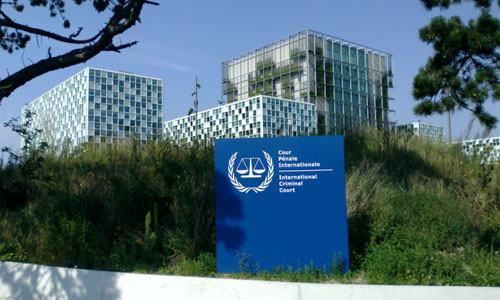ICC is an International Criminal Court investigates and brings to justice people responsible for genocide, crimes against humanity and war crimes, intervening when national authorities cannot or will not prosecute. The ICC was established by a UN treaty in 2002, and has been ratified by 123 countries, including Afghanistan but several large countries - including China, India, Russia and the US - have refused to join. The US administrations have long criticized the ICC, arguing its soldiers could become the subject of political lawsuits. However, President Bill Clinton signed the treaty establishing the court before the end of his term in office, but the US Congress never ratified it.
In November 2017, Fatou Bensouda, the ICC Chief prosecutor, asked judges to open a formal investigation into the alleged war crimes committed by the Taliban, the Haqqani network, Afghan forces, the US military and CIA. On Friday, the International Criminal Court’s pre-trial judges unanimously rejected the request by the court’s chief prosecutor to investigate alleged war crimes and crimes against humanity possibly committed on the territory of Islamic Republic of Afghanistan -- a move applauded by the Trump administration. As quoted, a statement from the time, Bensouda’s office “determined that there is a reasonable basis to believe” that members of the US armed forces and the CIA committed “war crimes,” particularly in 2003-2004.
The allegations against the United States relate to torturing Taliban and al-Qaida prisoners in Afghanistan and at secret CIA detention facilities. ICC prosecutors have also blamed the Taliban for some 17,000 civilian deaths from 2007 to December 2015, including “numerous attacks” on schools, hospitals and mosques. Reportedly, they also alleged that Afghan security forces have tortured prisoners at detention centers.
The court decision comes after US secretary of State Mike Pompeo last month warned ICC to sanction and revoke the visas of ICC staffs. Bensouda’s US visa already was revoked as both Fatou Bensouda’s office and the US State Department reportedly confirmed that her entry visa to the US had been revoked. “The Office of the Prosecutor has an independent and impartial mandate under the Rome Statute of the ICC. The Prosecutor and her Office will continue to undertake that statutory duty with utmost commitment and professionalism, without fear or favor,” as quoted her office said in a statement. According to a media release about the decision, the three judge panel “concluded that at this stage investigation in the current situation of Afghanistan would not serve the interests of justice.” The judges considered the time since the 2006 preliminary examination “and the political changing scene in Afghanistan since then” as well as “the lack of cooperation that the Prosecutor has received,” which they said was “likely to go scarcer should an investigation be authorized.”
However, the judges found Bensouda’s request “establishes a reasonable basis to consider that crimes within the ICC jurisdiction have been committed in Afghanistan,” according to the release. Bensouda’s office noted this in its statement about the decision and said it would “further analyze the decision and its implications, and consider all available legal remedies.” On the other hand, Amnesty International pilloried the decision, calling it “a shocking abandonment of the victims” that “ultimately will be seen as a craven capitulation to Washington’s bullying and threats.” “The court has a moral and legal duty to reach out to the victims of crimes in Afghanistan and explain this decision,” Biraj Patnaik, South Asia Director at Amnesty International, said as quoted in a statement.
The Trump administration welcomed the move, which came after Secretary of State Mike Pompeo announced in mid-March that the US would deny or revoke visas for ICC staff in response to the potential investigation. “This decision is a victory for the rule of law and the integrity of the ICC as an institution, given the United States is not subject to the ICC’s jurisdiction,” Pompeo said in a statement Friday. Reportedly, Washington signed, but not ratified the Rome Statute though it worked with the ICC under the Obama administration to bring Ugandan militants to justice.
“This would have been a very political effort to try to take on people acting on behalf of the United States in ways that were completely inconsistent with our laws and try to hold them accountable in ways that were completely inappropriate,” he said. “I am very pleased the ICC made this decision today. It’s the right one.” “Know that if Americans are found things to have done things that are unlawful or against the laws of war, the US system will always hold them accountable, but the ICC is not the right place to do it,” Pompeo said. President Donald Trump said that it was “a major international victory, not only for these patriots, but for the rule of law.”
“We welcome this decision and reiterate our position that the United States holds American citizens to the highest legal and ethical standards,” he said in a statement, warning that “any attempt to target American, Israeli, or allied personnel for prosecution will be met with a swift and vigorous response.” The US National security adviser John Bolton hailed the move as “a vindication of our position.” “We are a democratic society, we are accountable for what we do and we hold our own citizens responsible for their actions. No international court under those circumstances can be constitutionally legitimate,” as reflected in media Bolton said during a briefing with reporters on Friday.
Home » Opinion » ICC Rejects Appeal to Investigate War Crimes in Afghanistan
ICC Rejects Appeal to Investigate War Crimes in Afghanistan
| Mohammad Zahir Akbari

